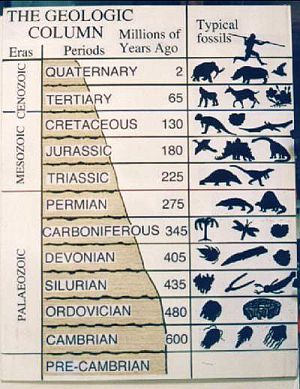Laws don't change. Theories change with every new discovery, like the discovery of fossils that had working compound eyes, long before they should have according to "theory". So they invent a new theory, and decide that maybe, somehow, eye evolution was put on the fast track by randomness and chance. Here is what you believe happens accidentally:
When an eye begins to develop, even in the simplest of living things, the genetic
code < (programed instructions) responsible for the eye, programs the body to start growing
2 million nerve endings from the eyes that move through the flesh toward the brain. And another
2 million from the brain moving through the flesh toward the eyes. These optic nerves must then find and match up with it's correct mate for the eye to function. That is design, not a crap shoot. The fact that the eye has the ability to transmit to the brain over 1 and 1/2 million messages simultaneously, at 300 miles an hour is just the icing on the cake. The working eye is complex at it's core. Nothing random or simple about it. It is a work of art.
Psalm 139:14
I praise
you, for I am fearfully and
wonderfully made. Wonderful are your works; my soul knows it very well.
Goddamn, are you full of shit;
The Poor Design of the Human Eye
The vast majority of people will suffer significant loss of visual function in their lifetimes, and for many people, it starts even before puberty. I got glasses after my first eye exam when I was in the second grade. Who knows how long I had actually needed them? My vision isn’t just a little blurry; it’s terrible. My lenses are -4.25 diopters, which means my vision is somewhere around 20/400. Had I been born before, say, 1600, I would probably have gone through life unable to do anything that required me to see further than arm’s length. In pre-history, I would have been worthless as a hunter. Or a gatherer, for that matter.
Compare this to the excellent vision of most birds, especially birds of prey, such as eagles and condors. Their visual acuity at great distances puts even the best human eyes to shame. Many birds can see a broader range of wavelengths than we can also, including ultraviolet light. In fact, migrating birds detect north and south poles
with their eyes. It’s not clear if they are consciously aware of this perception, but it seems likely to me that they are, considering this information is conveyed by the same nerves that relay vision. This would mean that some birds can actually
see the earth’s magnetic field.
Many birds also have an additional translucent eyelid that allows them to look directly into the sun, at length, without damaging their retinas.
The superiority of the bird eye shows that whatever designed the human eye, be it nature or a deity, is
capable of producing eyes that are much better than the human eye. The question of why nature didn’t provide humans with better eyes is easily answered by evolutionary theory: it wasn’t strongly selected for. Alternatively, why an intelligent designer would deny his favorite creatures the excellent vision that he provided lowly birds is quite a mystery.


